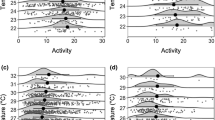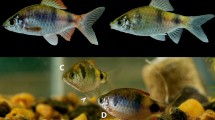Abstract
We manipulated parental work load without changing brood size in a population of pied flycatchers Ficedula hypoleuca by removing two primaries (7 and 9) from each wing of females, thus reducing wing area and increasing flight costs. At other nests, we offered supplementary food in the form of live mealworms (10–20 g daily from hatching) to reduce brood demand and thus parental foraging costs. Other nests were left as controls. The daily energy expenditure of females feeding 12-day-old nestlings was measured with doubly labelled water D2 18O. Females in both treatments expended the same amount of energy, fed at the same rate and had similar body masses to birds in the control group. No effect of treatment on male mass and feeding effort was detected. More nestlings, however, died in nests of handicapped females. Nestlings of handicapped females had significantly lower body mass and haematocrit values than nestlings in food-supplemented nests, with nestlings in control nests occupying an intermediate position. The effects of both treatments on nestling mass, haematocrit values and mortality rates were only noticeable in nests infested with mites. Maternal energy expenditure is apparently constrained and offspring pay the costs imposed by reduced provisioning rate or increased demand caused by ectoparasites, while receiving benefits when food supply improves. The presumption that avian reproductive costs derive from changes in a flexible energy output may not be met in many cases.
Similar content being viewed by others
Author information
Authors and Affiliations
Additional information
Received: 24 October 1998 / Received in revised form: 15 March 1999 / Accepted: 26 April 1999
Rights and permissions
About this article
Cite this article
Moreno, J., Merino, S., Potti, J. et al. Maternal energy expenditure does not change with flight costs or food availability in the pied flycatcher (Ficedula hypoleuca): costs and benefits for nestlings. Behav Ecol Sociobiol 46, 244–251 (1999). https://doi.org/10.1007/s002650050616
Issue Date:
DOI: https://doi.org/10.1007/s002650050616




